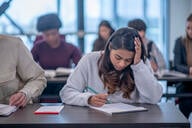You have /5 articles left.
Sign up for a free account or log in.

Yasir Qadhi
Rhodes College
ISIS has declared that a Rhodes College professor -- a key figure in American Islam -- is an apostate who deserves to be killed.
The call came in an article in Dabiq, the magazine of the extremist Islamic group ISIS. It attacks Muslim leaders who have criticized the recent murder of the people who worked at Charlie Hebdo, the French satirical magazine. "There is no doubt that such deeds are apostasy, that those who publicly call to such deeds in the name of Islam and scholarship are from the du’āt (callers) to apostasy, and that there is great reward awaiting the Muslim in the Hereafter if he kills these apostate imāms..."
The article is illustrated with a photograph of Yasir Qadhi, who teaches at Rhodes, with a caption calling him a murtadd, or apostate. (The magazine may be found here, and the reference to Qadhi is on page 60, but readers should be warned that the magazine contains extremely graphic photographs of violent acts by ISIS.)
In an interview on Sunday, Qadhi said he was concerned about the threat. But he has received many death threats over the years, he said, after right-wing American groups criticized him as a "radical imam." Qadhi said federal authorities were the first to tell him about the ISIS threat, and that they advised him to take certain security precautions, but not to reveal them.
So why would Qadhi (whose name sometimes appears as Kazi) have the distinction of being the first American academic to be targeted by ISIS in this way?
Qadhi is an adjunct at Rhodes, and teaches three courses a year. But he has a wide following among Muslims in the United States and elsewhere. He was born in Houston, but has attracted attention both from American government officials and from ISIS because he is a traditional Muslim in many ways, serving as cleric at a Memphis mosque, with a master's degree from the University of Medina, an academic pedigree that to Muslims identifies him as devout and learned. But he followed that degree with doctoral education at Yale University, and embraces Western means (YouTube) to spread his message. Qadhi combines a strong assertion of Muslim identity (and he talks about the ways the West demeans Islam) with strong preaching against violence.
He said the immediate spur for ISIS was probably his take on the Charlie Hebdo murders, which he has repeatedly and publicly condemned. Typical of Qadhi's take on Western treatment of Islam, he said Sunday that it is important to talk about "double standards" in the way the West thinks about which groups can be mocked. "We don't make fun of 9/11 victims, or soldiers who die in war or people with disabilities," he said. But Islam appears to be treated as a fair target. And Qadhi said that's wrong.
But Qadhi said, repeating the comments he believes angered ISIS, that no cartoon could justify violence. And he said that those who carried out the murders in Paris harmed Islam. "The damage and harm these killers have done to Islam is many times more than any potential damage by the cartoonist. These people have harmed the image of my prophet more than the cartoonist," he said.
Qadhi's take on many issues reflects the fact that he has "one foot in American academe" and the other very much in Muslim theology. He did not set off on this path originally. He grew up the son of Pakistani immigrants, and studied chemical engineering at the University of Houston. In 1995, feeling a tug of his heritage, he went to Medina, where he enrolled at the University of Medina. Qadhi said that 9/11 was "a wake-up call" for him, and he realized that he identified as an American and wanted to lead a Muslim life in the United States. So he went to Yale for his Ph.D., and then landed in 2010 at Rhodes, while working at the Memphis Islamic Center and lecturing in the United States and abroad.
A New York Times Magazine profile of Qadhi in 2011 described him as "the rare Western cleric fluent in the language of militants, having spent nearly a decade studying Islam in Saudi Arabia, steeped in the same tradition that spawned Osama bin Laden’s splinter movement. Arguably few American theologians are better positioned to offer an authoritative rebuttal of extremist ideology." But the article noted how difficult a role this is -- even for someone with Qadhi's credentials and following.
In 2011, several right wing groups dubbed him a radical and posted a video in which Qadhi says that various statements he made were spliced together to imply that he regularly insulted Christian people. (Qadhi published a post explaining the context of these various statements and how they meant very different things than what the Web critics said was the case, and clarifying that he in fact respects people of different faiths than his own.) These groups Web sites included the e-mail and other addresses for Rhodes College officials and urged readers to lobby the college to fire him.
Rhodes continued to employ Qadhi. "I am very grateful to Rhodes College," he said. "They didn't have to, but they stood their ground and realized this was a doctored video."
Of being attacked as a jihadist by the right and an apostate by ISIS, Qadhi said that "of course it's ironic. It would be funny but not for the fact that it was scary."
On Facebook this weekend, Qadhi posted thoughts about his situation:
"I guess getting death threats from the Far Right and from ISIS should be a good sign, as that indicates I'm in the middle, and hopefully those threats will cancel each other out! Ironically, both groups also demonstrate how blinded they are in their own ways, and how hard their hearts have become. Each group CLAIMS to be fighting for 'freedom,' but in their hatred, they have resorted to terrorism and threats of violence and bloodshed, thus becoming the exact enemy they claim to be fighting. In any case, and as always, I place my trust in Allah, the only One worthy of being trusted, for He will take care of me if I am sincere to Him."

